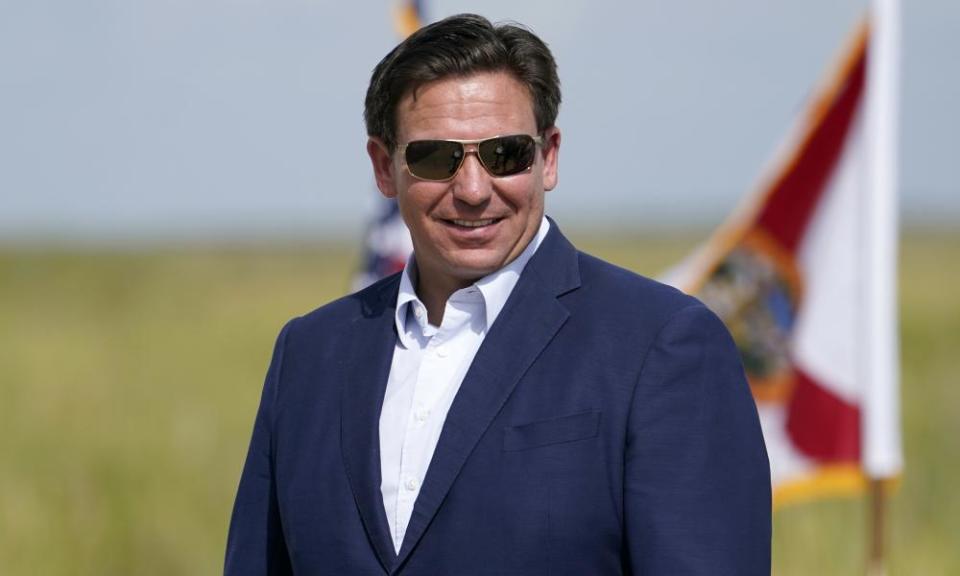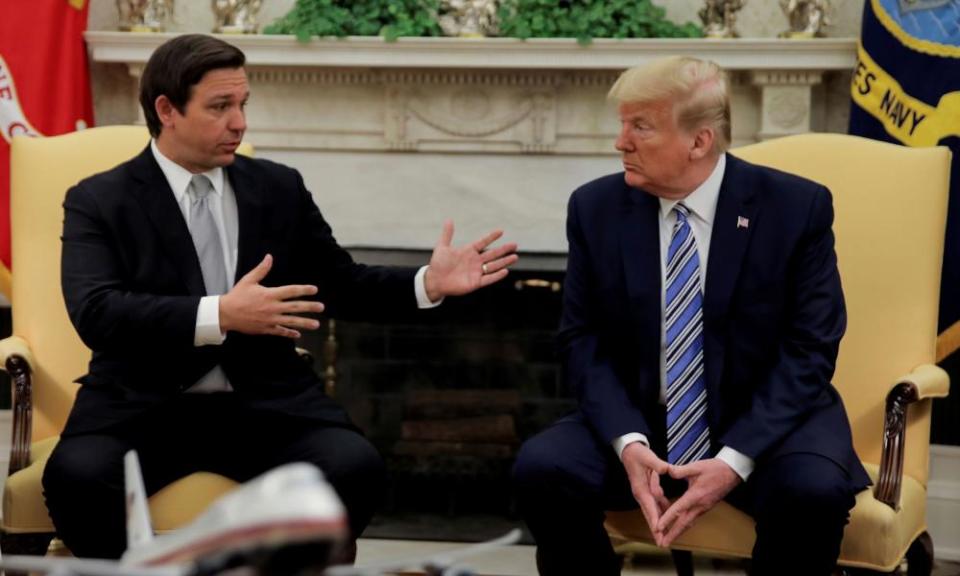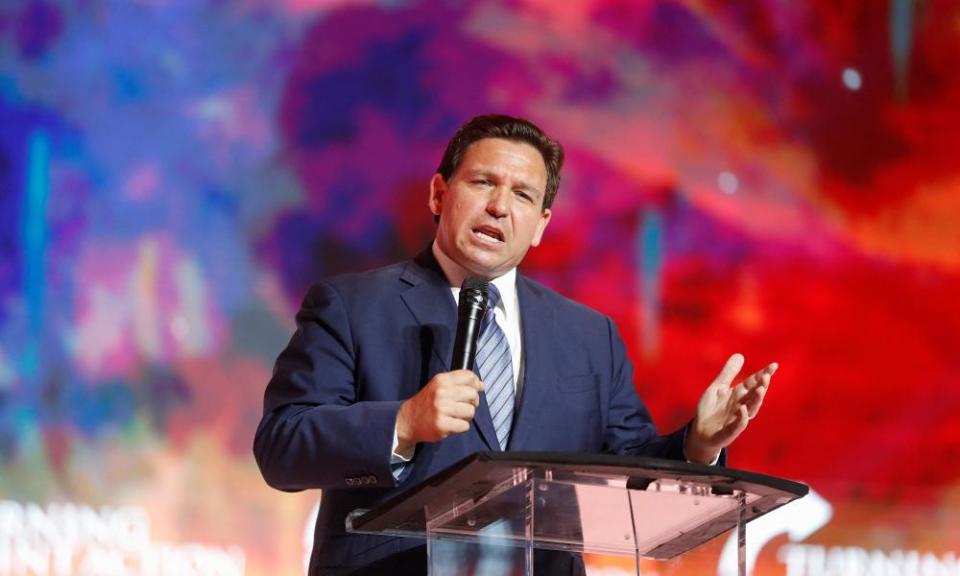Best of frenemies: Ron DeSantis stalks Trump with Republican primary tour

As Florida’s governor, Ron DeSantis, packs his suitcase for a five-day trip to campaign for Trump-endorsed candidates, he might afford himself a dastardly chuckle.
The trek, taking in Arizona, New Mexico, Ohio and Pennsylvania is nominally aimed at boosting Republicans’ chances ahead of November’s crucial primaries. For DeSantis, however, there is surely a grander design. Each of the rising Republican star’s destinations is a swing state, key to winning the 2024 presidential election.
Related: As Trump’s star wanes, another rises: could Ron DeSantis be the new Maga bearer?
The Florida governor – who must walk the tightrope of being both ally and rival of Trump – is hotly tipped to run for president, and this outwardly benevolent campaigning trip will further swell his profile.
There is a downside, however. DeSantis’s sojourn will put him on a collision course with the Republican party’s most sensitive, volatile and powerful figure: Donald Trump. With this tour, DeSantis’s tightrope is getting more and more rocky.
Trump was key to getting DeSantis, who has been dubbed a “mini-Trump”, elected governor in 2018, but bad blood between the pair – particularly from Trump’s side – has been brewing for some time.
As DeSantis has become a new darling of the right, fueled by his introduction of anti-gay and anti-trans laws in Florida and a populist crusade against coronavirus lockdowns and masking, Trump, muzzled by his Twitter ban and besieged by lawsuits and congressional investigations, has found himself under siege.
The rise of DeSantis has not always gone down well with the twice-impeached former president who, according to one report, now “hates” his former protege.
The apparent feud is a far cry from 2018, when Trump swooped into the Florida gubernatorial primary, endorsed DeSantis, and propelled the then relatively obscure congressman to the Florida governorship.
DeSantis had been struggling in the 2018 governor primary. Most of the polls through 2017 and early 2018 had Adam Putnam, then the Florida agriculture commissioner, leading DeSantis. The few polls that didn’t have Putnam ahead showed the pair in an effective tie.

Until late June, that is, when Trump endorsed DeSantis in a tweet that hailed the gubernatorial hopeful as “strong on Borders, tough on Crime & big on Cutting Taxes”. In the next poll following that endorsement DeSantis was 20 points ahead. Trump held a rally for DeSantis in Tampa in July 2018, and the Floridian won the Republican nomination and beat Andrew Gillum, his Democratic opponent, by about 32,000 votes in the election proper. A star was born.
“I’d like to thank our president,” DeSantis said in his victory speech, to cheers from the crowd, “for standing by me when it wasn’t necessarily the smart thing to do.”
But even during that campaign there had been warning signs that the DeSantis-Trump relationship might not be entirely harmonious.
In September 2018 Trump questioned, without evidence, the number of people who died when Hurricane Maria hit Puerto Rico a year earlier. A study commissioned by the Puerto Rican government found that almost 3,000 people died as a result of the category 4 hurricane.
There was outrage from many. From DeSantis, there was a more tepid, but still meaningful, disagreement.
“He doesn’t believe any loss of life has been inflated,” DeSantis’s campaign said in a statement.
That rebuttal, the New York Times reported, was enough to leave Trump “absolutely livid”.
Vanity Fair reported in July 2021 that Trump and DeSantis were on a “collision course”. That June, DeSantis beat Trump in a conservative poll of candidates’ approval ratings, albeit by less than 3%. DeSantis’s popularity was soaring, and his one-time benefactor was upset.
“Trump fucking hates DeSantis. He just resents his popularity,” a Trump confidant told Vanity Fair’s Gabriel Sherman.
At 43 years old, Ronald Dion DeSantis is more than three decades younger than Trump, who will be 78 on election day in 2024.

Born in Jacksonville, Florida, DeSantis studied at Yale and at Harvard law school before becoming a prosecutor in the navy, where he received decorations for prosecuting cases involving fraud related to military medals, according to a Freedom of information request submitted by the Florida Phoenix. DeSantis was deployed to Iraq in 2007, where he served as a legal adviser, and was honorably discharged in 2010.
In 2012 DeSantis ran for the US House of Representatives and won, and went on to co-found the House Freedom Caucus, a particularly rightwing group of congressmen, many of whom had emerged from the early Obama-era Tea Party.
After a pretty unremarkable spell in Congress – the Miami Herald reported that none of the bills DeSantis introduced as the original sponsor became law – DeSantis found himself as governor of Florida, a position which propelled him into the national spotlight.
He would become a regular contributor to Fox News, the conservative movement tastemaker, and in the year following the 2020 presidential election was asked to appear on the channel more than 110 times, according to the New Yorker, agreeing at least 34 times.
So far in 2022, the trend has continued. DeSantis has been among the most interviewed Republicans on Fox News, while Trump, as of mid-August, had not been interviewed on the network for more than 115 days.
DeSantis is seen by some conservatives as a more palatable, more electable, version of the original: still outspoken against the media or perceived foes when he wants to be, but less prone to explosions of temper, and with a less turbulent past. DeSantis has also not been impeached twice, and is not being investigated for inciting an insurrection, which could help win over wavering voters.
But DeSantis is just as extreme – perhaps more extreme – than Trump. As governor he has targeted minority groups, introducing legislation that seems designed to thrill the rightwing Republican base.
In March of this year DeSantis signed into law a “don’t say gay” bill, which prohibits discussion of sexuality and gender identity in schools, a move that advocates say could harm the mental health of LGBTQ+ youth. The governor’s administration has also moved to ban gender-affirming medical treatment for trans youths, an effort described as “transparently political” by the Human Rights Campaign.
DeSantis suspended a Florida state prosecutor in early August after the latter said he would not enforce a 15-week abortion ban, while the state has also banned certain math textbooks, alleging references to critical race theory.
That resentment continued to fester. In January 2022 a spate of stories emerged in the political press that Trump had become increasingly unhappy with DeSantis.
Axios reported that behind the scenes, Trump would frequently criticize his former charge.
“He says DeSantis has no personal charisma and has a dull personality,” a source told Axios. The news site reported that Trump’s irritation stemmed from the fact that DeSantis has not ruled himself out of the running for the 2024 presidential election, should Trump himself run.
Marco Rubio, the Florida senator who also ran for president in 2016, Rick Scott, Florida’s former governor and current senator, and the rising antagonist congressman Josh Hawley have all done so, to varying degrees.
Trump still dominates the Republican party. A slew of Trump-endorsed candidates – including the ones DeSantis will campaign for – won their primaries, and could be elected in November, cementing Trump’s reputation as a GOP kingmaker.
But with Trump’s travails ongoing, there is an opening for others. A July poll, conducted as the congressional hearings into the January 6 insurrection drew to a close, found that one-third of Republicans think Trump should not run for president again in 2024.
All this leaves DeSantis in a prime position to sweep up Republican voters, ahead of a 2024 primary.
That process will start when the governor will be the main attraction at a rally in Phoenix for Blake Masters, a Senate candidate endorsed by Trump.
The rightwing media are expected to cover the event closely. Also watching, no doubt, will be Donald Trump.

 money
money 